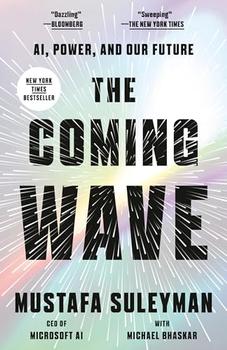Summary | Excerpt | Reviews | Beyond the Book | Readalikes | Genres & Themes | Author Bio

Technology, Power, and the Twenty-first Century's Greatest Dilemma
by Mustafa SuleymanThe Containment Problem
Revenge Effects
Alan Turing and Gordon Moore could never have predicted, let alone altered the rise of, social media, memes, Wikipedia, or cyberattacks. Decades after their invention, the architects of the atomic bomb could no more stop a nuclear war than Henry Ford could stop a car accident. Technology's unavoidable challenge is that its makers quickly lose control over the path their inventions take once introduced to the world.
Technology exists in a complex, dynamic system (the real world), where second-, third-, and nth-order consequences ripple out unpredictably. What on paper looks flawless can behave differently out in the wild, especially when copied and further adapted downstream. What people actually do with your invention, however well intentioned, can never be guaranteed. Thomas Edison invented the phonograph so people could record their thoughts for posterity and to help the blind. He was horrified when most people just wanted to play music. Alfred Nobel intended his explosives to be used only in mining and railway construction.
Gutenberg just wanted to make money printing Bibles. Yet his press catalyzed the Scientific Revolution and the Reformation, and so became the greatest threat to the Catholic Church since its establishment. Fridge makers didn't aim to create a hole in the ozone layer with chlorofluorocarbons (CFCs), just as the creators of the internal combustion and jet engines had no thought of melting the ice caps. In fact early enthusiasts for automobiles argued for their environmental benefits: engines would rid the streets of mountains of horse dung that spread dirt and disease across urban areas. They had no conception of global warming.
Understanding technology is, in part, about trying to understand its unintended consequences, to predict not just positive spillovers but "revenge effects." Quite simply, any technology is capable of going wrong, often in ways that directly contradict its original purpose. Think of the way that prescription opioids have created dependence, or how the overuse of antibiotics renders them less effective, or how the proliferation of satellites and debris known as "space junk" imperils spaceflight.
As technology proliferates, more people can use it, adapt it, shape it however they like, in chains of causality beyond any individual's comprehension. As the power of our tools grows exponentially and as access to them rapidly increases, so do the potential harms, an unfolding labyrinth of consequences that no one can fully predict or forestall. One day someone is writing equations on a blackboard or fiddling with a prototype in the garage, work seemingly irrelevant to the wider world. Within decades, it has produced existential questions for humanity. As we have built systems of increasing power, this aspect of technology has felt more and more pressing to me. How do we guarantee that this new wave of technologies does more good than harm?
Technology's problem here is a containment problem. If this aspect cannot be eliminated, it might be curtailed. Containment is the overarching ability to control, limit, and, if need be, close down technologies at any stage of their development or deployment. It means, in some circumstances, the ability to stop a technology from proliferating in the first place, checking the ripple of unintended consequences (both good and bad).
The more powerful a technology, the more ingrained it is in every facet of life and society. Thus, technology's problems have a tendency to escalate in parallel with its capabilities, and so the need for containment grows more acute over time.
Does any of this get technologists off the hook? Not at all; more than anyone else it is up to us to face it. We might not be able to control the final end points of our work or its long-term effects, but that is no reason to abdicate responsibility. Decisions technologists and societies make at the source can still shape outcomes. Just because consequences are difficult to predict doesn't mean we shouldn't try.
Excerpted from The Coming Wave by Mustafa Suleyman. Copyright © 2023 by Mustafa Suleyman. All rights reserved. No part of this excerpt may be reproduced or reprinted without permission in writing from the publisher.
Every good journalist has a novel in him - which is an excellent place for it.
Click Here to find out who said this, as well as discovering other famous literary quotes!
Your guide toexceptional books
BookBrowse seeks out and recommends the best in contemporary fiction and nonfiction—books that not only engage and entertain but also deepen our understanding of ourselves and the world around us.